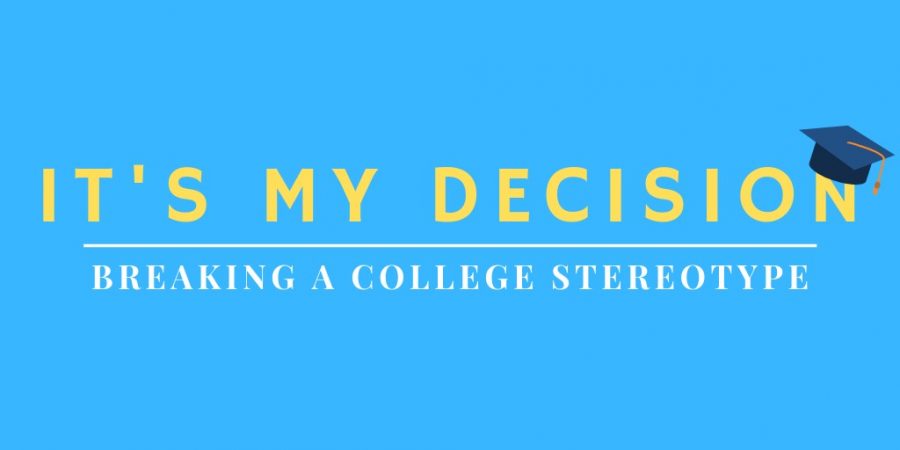Decision Day: You are not your college choice
April 15, 2019
It’s decision season. As we near the end of high school, the environment becomes filled with eagerness, positivity and support as the seniors decide where they will spend their next four years.
But does your non-brand name college make you a little nervous to show pride in your school? Does the acceptance rate of your college make you self-conscious? Does attending a “party schools” make you a party kid?
I’m not going to lie. During junior year, I knew so little about college that I judged people’s academic ability based on the school they were attending, sometimes without even knowing the person. Horrible, I know. But what do juniors know about college?
After reflecting on my ignorant former self, I’m now trying to find where those judgments came from. Why did I make those assumptions and categorize students for going to a school that didn’t have a brand name, or if it had a high acceptance rate? Why did I compare and label students?
Maybe it was the competitive nature of LFHS that conditioned me to believe going to a less selective school was something to be shameful about. You aren’t as good as your friend who got into an Ivy. You should have taken more AP’s. You should have taken the ACT just one more time; these thoughts are ingrained into our high school minds.
Some may find highly selective colleges to be a status symbol; an indication that you are chosen, while others are left behind to attend schools with less prestige and sophistication. It is this one-sided notion that amplifies the stigma attached to “safety schools.”
No, going to a “safety school” does not make you stupid. It does not make you less than, and it does not take opportunities away from you that you thought you had when applying to your top school. It’s not just your GPA or your standardized test score that determines where you go to college. Location, size, programs for a certain major, student life, and of course, tuition (not everyone has the luxury of choosing their school without taking a look at the cost of their degree), are all things that contribute to a student’s decision.
Community college is another option that is often misunderstood as a last resort school. Community college can act as a conduit for students who want to get college credit, and then transfer to a university. Some people use it as a financial buffer, and others use it as an academic supplement.
Yes, it’s real college, and it’s nothing to be embarrassed about.
I had a conversation with a friend recently about Decision Day, and how cool it was going to be to see all the different colleges everybody committed to. But then, she added how she was afraid people would judge her for the college she had chosen.
The decision process itself is filled with judgement. Admissions counselors compare you to others, and pick you based on what you offer the school and its reputation. Students are left so vulnerable in this process—it’s no surprise a bit of that judgement would trickle into the minds of high schoolers.
To LFHS, the Lake Forest community, future employer—everyone. Do you believe the status of a college determines the academic outcome or employment of a student? My answer is no. Your outcome is determined by the work you put in, not by the “eliteness” of the institution.
Like any other social issue, the first step is of breaking a stigma is becoming aware. Senior year broke me out of the unhealthy habit of judging before knowing. Applying for college humbles you, and makes you aware of all the factors that are involved in making your decision. It helps you let go of things you can’t control, and empowers you to support those who are going through the same stressful, scary process.
Going to your top choice school? Great. Left with only your safety school? Awesome. Forget the stigma—be proud of the last four years, and be proud of the next four.








Anna A • Apr 24, 2019 at 7:53 pm
Rana, thank you so much for writing this. It’s such a necessary message in this school environment. Keep it up!
Margaux Miller • Apr 22, 2019 at 7:13 pm
Rana!!! So well written woohoo! You killed this
Bridget mcgreevy • Apr 22, 2019 at 3:07 pm
Definitely feel like this article needed to be written. Great job Rana!
Jacqueline Berkshire • Apr 22, 2019 at 8:49 am
What a thoughtful, sensitive and enlightening article! It reminds me of a quote that hung on my office wall for many years, “Look not to others for all that you are—for YOU are the light of your own journey”.
Bill Smith • Apr 15, 2019 at 8:48 am
Thank you for writing this. Going to college is about where you go, it is about what best suits your needs and what you makes you happy. Nice job!